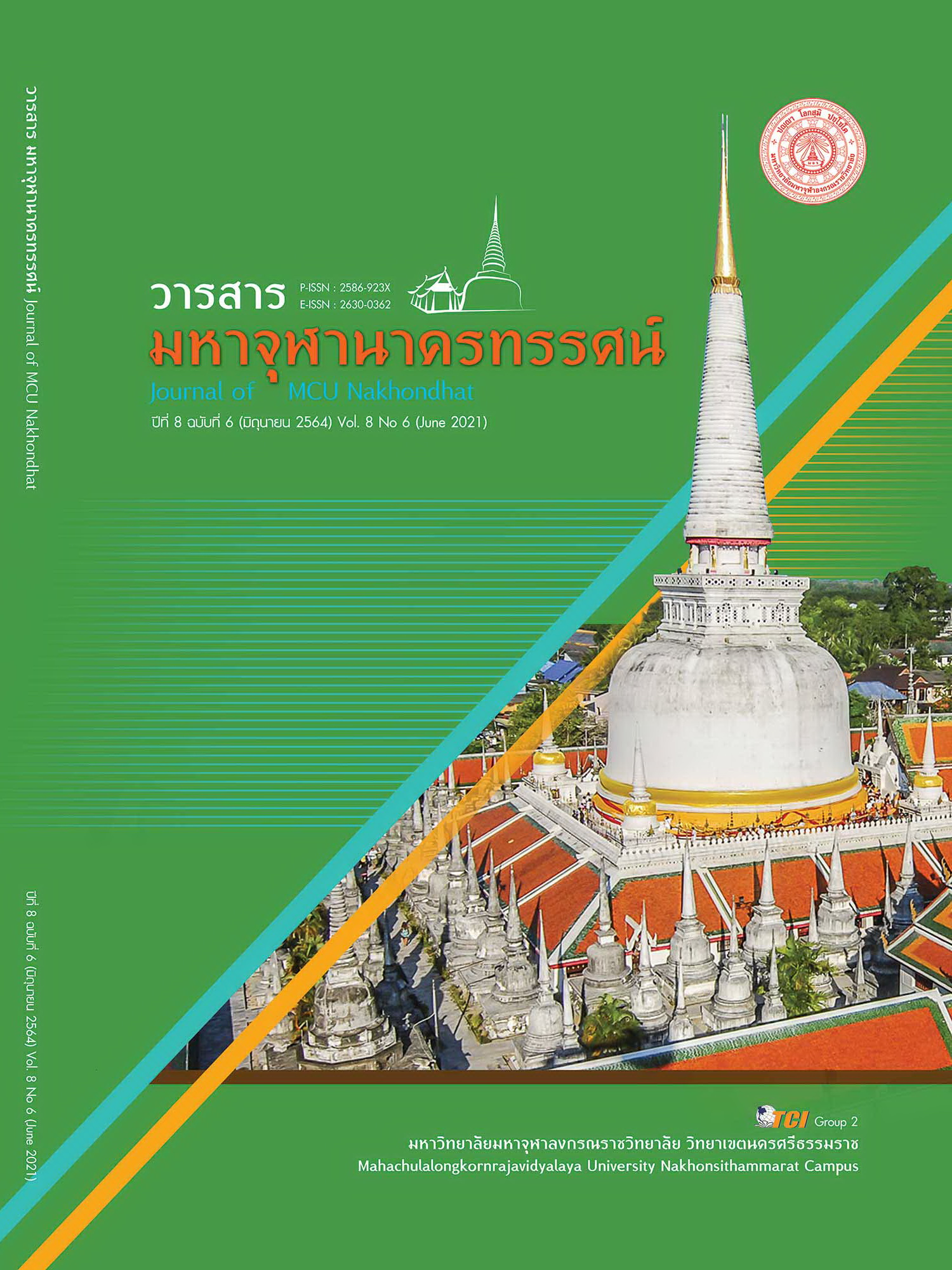THE APPLICATION OF MORALITY, ETHICS AND CODE OF CONDUCT WITH THE THREEFOLD TRAINING TO BE THE PROFESSIONAL SCHOOL ADMINISTRATORS
Main Article Content
Abstract
The professional school administrators must be leaders with morals, ethics and professional ethics. Resulting in operational satisfaction resulting in efficient performance of the organization or school. The Ministry of Education therefore emphasizes on educational institution administrators to have knowledge and morals. Focus on the development and empowerment of people. With strategies for school administrators have leadership potential with sustainable management mind. And realize their roles, duties and responsibilities with pride in the professional school administrators. Including the shame of behaving badly Because the one who will be the teacher must be a good person Have faith in the profession Ready to practice the educational profession in accordance with professional standards and professional . Ethics, The application of Morality, Ethics and Code of Conduct in the Educational Administration towards A Professional school Administrators by Threefold Training. Consist of Sila (Physical behavior), Samathi (Mental training) and Panna (Enlightenment), to applied in The School Administrators Ethics comprised 4 components as follows; 1) the Ethics on personal performance, 2) the Ethics on profession, 3) the Ethics on Client, 4) the Ethics on Professional Personnel, and 5) the Ethics on Society. Can be adopt that approach, build skills of personal excellence. Have a strategic thinking and innovation And academic leadership. The apply to the norm to administration, self-governance, People governance and Work governance as a perfect of the (school) administrators that is both of ethical and be aware of changing conditions. This is an important attribute of the professional school administrators that the society needs and also the image that will make the organization to great success. Including the quality of the teachers, staff and students are of perfect quality, good and good people.
Article Details
References
คุณัชญา สมจิตร และผดุง พรมมูล. (2561). การปฏิบัติตนตามจรรยาบรรณวิชาชีพของครูในโรงเรียนสังกัดสำนักงานเขตพื้นที่การศึกษาประถมศึกษาจังหวัดชุมพร. ใน วิทยานิพนธ์ศึกษาศาสตรมหาบัณฑิต สาขาวิชาการบริหารการศึกษา. มหาวิทยาลัยสวนดุสิต.
ณัฏยาณี บุญทองคํา. (2556). คุณธรรมจริยธรรมของผู้บริหารที่มีต่อสังคม. วารสาร มจร สังคมศาสตร์ปริทรรศน์, 2(3), 82-93.
พระพรหมคุณาภรณ์ (ป.อ.ปยุตฺโต). (2556). พจนานุกรมพุทธศาสตร์ฉบับประมวลธรรม. กรุงเทพมหานคร: โรงพิมพ์มหาจุฬาลงกรณราชวิทยาลัย.
พระราชบัญญัติการศึกษาแห่งชาติ พ.ศ. 2542. (2542) ราชกิจจานุเบกษา เล่ม 116 ตอน 74 ก หน้า 1-19 (19 สิงหาคม 2542).
พระราชบัญญัติการศึกษาแห่งชาติ (ฉบับที่ 2) พ.ศ. 2545. (2545) ราชกิจจานุเบกษา เล่ม 119 ตอน 123 ก หน้า 16-21 (19 ธันวาคม 2545).
พระราชบัญญัติการศึกษาแห่งชาติ (ฉบับที่ 3) พ.ศ. 2553. (2553) ราชกิจจานุเบกษา เล่ม 127 ตอน 45 ก หน้า 1-3 (22 กรกฎาคม 2553).
รพีพรรณ เอกสุภาพันธุ์. (2552). การพัฒนายุทธศาสตร์การเสริมสร้างจรรยาบรรณของวิชาชีพผู้บริหารสถานศึกษา สังกัดสำนักงานคณะกรรมการการศึกษาขั้นพื้นฐาน. ใน วิทยานิพนธ์ครุสาสตรดุษฎีบัณฑิต สาขาวิชาบริหารการศึกษา. จุฬาลงกรณ์มหาวิทยาลัย.
ราชบัณฑิตยสถาน. (2563). พจนานุกรมฉบับราชบัณฑิตยสถาน. เรียกใช้เมื่อ 4 ตุลาคม 2563 จาก https://dictionary.orst.go.th/index.php.
สภาครูและบุคลากรทางการศึกษา. (2560). มาตรฐานวิชาชีพทางการศึกษา. กรุงเทพมหานคร: คุรุสภาสภาครูและบุคลากรทางการศึกษา.
สำนักงานคณะกรรมการข้าราชการครูและบุคลากรทางการศึกษา. (2548). พระราชบัญญัติระเบียบข้าราชการครูและบุคลากรทางการศึกษา พ.ศ. 2547. กรุงเทพมหานคร: โรงพิมพ์คุรุสภาลาดพร้าว.
สำนักงานเลขาธิการคุรุสภา. (2541). ประวัติครู 16 มกราคม. กรุงเทพมหานคร: องค์การค้าของคุรุสภา.
สำนักงานเลขาธิการสภาการศึกษา กระทรวงศึกษาธิการ. (2560). แผนการศึกษาแห่งชาติ พ.ศ. 2560 – 2579. (พิมพ์ครั้งที่ 2). กรุงเทพมหานคร: สำนักงานเลขาธิการสภาการศึกษา.
สำนักนโยบายและแผนการศึกษาขั้นพื้นฐาน. (2562). นโยบายสำนักงานคณะกรรมการศึกษาขั้นพื้นฐาน. กรุงเทพมหานคร: สำนักงานคณะกรรมการการศึกษาขั้นพื้นฐาน.
สำนักนโยบายและยุทธศาสตร์ สำนักงานปลัดกระทรวงศึกษาธิการ. (2562). แผนยุทธศาสตร์กระทรวงศึกษาธิการ (พ.ศ. 2563-2565). กรุงเทพมหานคร: กระทรวงศึกษาธิการ.
อำนาจ บัวศิริ. (2561). กระบวนการสร้างภาวะผู้นำด้วยหลักไตรสิกขา. วารสารครุศาสตร์ปริทรรศน์, 5(3), 1-12.
เอกพันธ์ ปัดถาวะโร. (2563). จรรยาบรรณวิชาชีพ. เรียกใช้เมื่อ 4 ตุลาคม 2563 จาก http:// aekapan.blogspot.com/2012/08/blog-post.html.


